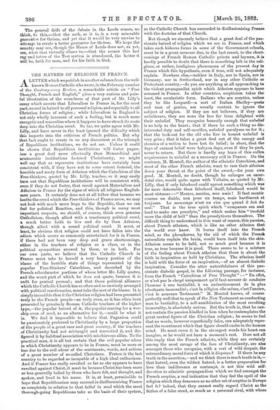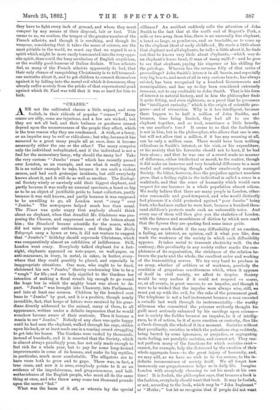THE HATRED OF RELIGION IN FRANCE.
ALETTER which we publish in another column from the well- known Roman Catholic who wrote, in the February number of the Contemporary Review, a remarkable article on "Free Thought, French and English," gives a very curious and pain- ful illustration of the soundness of that part of Mr. Lilly's essay which asserts that Liberalism in France is, for the most part, rooted in hatred to all personal religion, and especially to all Christian forms of religion ; while Liberalism in England is not only wholly innocent of such a feeling, but is much more energetic and masculine where it happens to have struck its roots deep into the Christian creed. So far, we quite agree with Mr. Lilly, and have never in the least ignored the difficulty which this imports into the criticism of French politics. But why that fact ought to create in us any discontent at the triumph of Republican institutions, we do not see. Unless it could be shown that Republican institutions will foster pagan- em a great deal more effectually than Monarchical and aristocratic institutions fostered Christianity, we might well say that as repressive institutions have certainly been consistent with, if they have not to some extent fostered, the horrible and nasty form of Atheism which the Catechism of the Free-thinkers, quoted by Mr. Lilly, teaches, so it may easily tarn out that Republican institutions will be consistent with, even if they do not foster, that recoil against Materialism and Atheism in France for the signs of which all religious English- men yearn. It certainly does not at all follow that because we loathe the creed which the Free-thinkers of France avow, we may not look with much more hope to the Republic, than we can feel for political Reaction, and this, though in many most important respects, we should, of course, think even genuine Catholicism, though allied with a reactionary political creed, a much better faith to live and die by than Atheism, though allied with a sound political creed. It must, at least, be obvious that religion could not have fallen into the odium which seems so commonly entertained for it in France, if there had not been very deep and grave shortcomings, either in the teachers of religion as a class, or in the political sympathies avowed by them, or in both. For our own parts, we believe that the Catholic Church in France must take to herself a very heavy portion of the blame of the horrible state of things represented by the popular Free-thinkers' Catechism, and described by the French schoolmaster portions of whose letter Mr. Lilly quotes, and the worst part of which he does not quote, because it is unfit for general perusal ; and that those political alliances which the Catholic Church has so often and so unwisely arranged with political reactionaries, must take the rest of the blame. It is simply incredible that if the Christian religion had been presented truly to the French people—as truly even, as it has often been presented by genuinely Roman Catholic teachers of the higher type,—the popular hatred of it, the popular craving for a wor- ship even of mud, as an alternative for it,—could be what it is. We find it impossible to believe that Paganism could be passionately preferred to Christianity by a large proportion of the people of a great race and great country, if the teachers of Christianity bad not mistaught and travestied it, and dis- figured it by habitual association with mischievous allies. To the practical man, it is all but certain that the evil popular odour in which Christianity appears to be in France, must be more or less due to the evil odour of the sentiments, words, and actions of a great number of so-called Christians. France is the last country to be regarded as incapable of a high ideal enthusiasm. And if France has really revolted so far as she appears to have revolted against Christ, it must be because Christ has been more or less generally belied by those who have felt, and thought, and spoken, and lived in his name. It is, at least, permissible to hope that Republicanism may succeed in disillusionising France as completely in relation to that belief in mud which the most thorough-going Republicans take as the basis of their system,
as the Catholic Church has succeeded in disillasionising France with the doctrine of that Church.
But though we sincerely believe that a great deal of the pas- sionate hatred of religion which we see in France, and which takes such hideous forms in some of the Government schoole, must be in a great measure due, in the last resort, to the short- cominge of French Roman Catholic priests and laymen, it is hardly possible to doubt that there is something left in the reli- gious, or rather, irreligious phenomena of the present day in France which this hypothesis, even if true, will not adequately explain. Nowhere else,—neither in Italy, nor in Spain, nor in Germany, nor in Switzerland, nor in any other Catholic or Protestant country,—do you see anything at all approaching to the violent propagandist spirit which Atheism appears to have assumed in France. In other countries, scepticism takes the inert, the secularistic form. Italians who are sceptics, mikes they be like Leopardi—a sort of Italian Shelley—poets and men of genius, are usually content to ignore the subject of religion. If they are not believers, if they are unbelievers, they are none the less far from delighted with their unbelief. They recognise honestly enough that unbelief is no help to the heart ; that if there be such a thing as dis- interested duty and self-sacrifice, unbelief paralyses us for it ; that the look-out for the old who live in honest unbelief is very grim ; that it takes a great deal out of the energy and stamina of a nation to have lost its belief; in short, that the days of earnest belief were halcyon days, even if they be past, never to return. But there is hardly any trace of this sullen acquiescence in unbelief as a necessary evil in France. On the contrary, M. Monteil, the author of the atheistic Catechism, and most of the other French atheists, want to ram their atheism down your throat at the point of the sword,—for your own good. M. Monteil, no doubt, though he enlarges on sacer- dotal sins, would quite agree with Voltaire, as quoted by Mr. Lilly, that if only falsehood could uproot something which WWI far more detestable than falsehood itself, falsehood would be most virtuous :—" Mentez, mentez, mes amis ! II faut mentir comme un diable, non pour un temps, male hardiment et toujours. Le mensonge n'est un vice qne quand ii fait du mal." That is the true spirit which "compasses sea and land to make one proselyte," and which makes him "twofold more the child of hell" than the proselytisers themselves. The difficult thing to understand is this want of reason, this passion, about French atheism, which is like no other atheism that the world ever knew. It burns itself into the French mind, as the phosphorus, by the aid of which the French naturalists explain the brain, would burn itself into the skin. Atheism seems to be held, not so much good because it is true, as true because it is good. There seems to be a mixture of the feeling about French atheism that there is about the faith in inspiration as held by Christians. The atheism itself is held with the force of an inspiration,—of an almost diabolic inspiration. Consider the utter untruthfulness of this pas- sionate diabolic gospel, in the following passage, for instance, from the French "Catechism of Free Thought" :—" En effet, ce n'est pas le clergd uniquement qu'il faut accuser de conduire l'homme h une bestialit4, h un aneantissement de in plus revoltante immoralite ; c'est la religion elle-m6me, c'est l'ancien, c'est le nouveau Testament." M. Monteil knows, of course perfectly well that to speak of the New Testament as conducting man to bestiality, to a self-annihilation of the most revolting immorality, is absolutely untrue. But the truth is, that he can- not contain the passion kindled in him when he contemplates the great central figure of the Christian religion ; he seems to feel that no words, however superficially false, can adequately repre- sent the resentment which that figure should excite in the human mind. He must curse it in the strongest words his heart can imagine, or he would not have a moment's rest. Does not all this imply that the French atheists, while they are certainly among the most savage of the foes of Christianity, are also amongst those who recognise, with a sort of wild despair, the extraordinary moral force of which it disposes ? If there be any truth in the assertion,—and we think there is much truth in it,— that hatred, even the wildest hatred, is a better preparation for love than indifference or contempt, is not this wild self- devotion to atheistic propagandism which we find amongst the French sceptics, a real indication that they feel the spell of the religion which they denounce as no other set of sceptics in Europe feel it? indeed, that they cannot really regard Christ as the fiction of a false creed, so much as a personal rival, with whom
they have to fight every inch of ground, and whom they must conquer by any means at their disposal, fair or foul. This seems to us, we confess, the temper of the greater number of the French atheists, and though it is revolting, and though its weapons, considering that it takes the name of science, are the most pitiable in the world, we must say that we regard it as a spirit which might be more easily transmuted into the very oppo- site spirit, than could the busy secularism of English scepticism, or the worldly good-humour of Italian disdain. When atheists feel, as many of the French atheists apparently do feel, that their only chance of vanquishing Christianity is to tell tremend- ous untruths about it, and to get children to commit themselves against it by falling into the moral evil which it denounces, they already suffer acutely from the pricks of that supernatural goad against which St. Paul was told that it was so hard for him to kick.



































 Previous page
Previous page